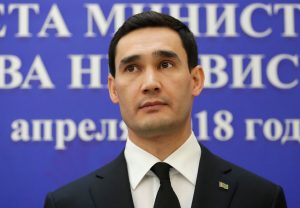On March 15, Turkmenistan’s Central Election Commission announced Serdar Berdimuhamedov, the son of current President Gurbanguly Berdimuhamedov, as the victor in last weekend’s elections. Officially, Serdar took 72.97 percent of the vote, and Turkmen election officials earlier claimed that turnout stood at 97 percent.
That the results took several days to announce is a curiosity. Russian media had earlier reported that results would be announced on March 14, while also running glowing commentary from observers from the Commonwealth of Independent States who assured readers that the election was democratic and transparent. RFE/RL’s Turkmen Service reported claims of a flurry of action at some voting stations after the polls closed, with officials refusing to accept ballots cast for the “wrong” candidate.
No Turkmen election has been judged as free and fair by international observers (except observers, like those from the CIS, who come from countries that also don’t hold free and fair elections).
According to Turkmen officials, there were 3.4 million registered voters, but there has been some debate about how many Turkmen citizens there are. Turkmenistan last held a census in 2012 (and is due for one this year), but never released the data. In 2021, the government claimed a population of more than 6 million, although other officials speaking to RFE/RL anonymously said the real population was below 3 million.
Despite the delay in announcing the results of the election (and perhaps some surprise at the percentage), the results were as nevertheless as expected. With Serdar’s “election,” Turkmenistan has become the first Central Asian state to transfer power dynastically from a father to a son.
Serdar’s 72.97 percent of the vote is far below his father’s previous vote shares. The elder Berdimuhamedov received a reported 97.67 percent in 2017 and 97.14 in 2012. In his first election in 2007, following the death in office of Turkmenistan’s first president in late 2006, Berdimuhamedov raked in 89.07 percent of the vote.
There were eight other candidates listed as running in the election but there were no debates and no real campaigning in the month-long period between the calling of the election and the day of the vote. According to RFE/RL, the second-place finisher was independent candidate and political nobody Hydyr Nunnayev, the deputy rector for scientific affairs of the Turkmen State Institute of Physical Culture and Sports.
Turkmenistan was not scheduled for a presidential election until 2024, when Berdimuhamedov’s current term was set to end. The elder Berdimuhamedov is 63 and his son turned 40 last September, the minimum age to run for president. It’s not entirely clear why the elder Berdimuhamedov decided to call for an early election. Most analysts point to his reported ill health (which sparked death rumors back in 2019), and the January events in Kazakhstan as possible motivating triggers.
Although all indications are that Serdar intends to follow in his father’s footsteps, Turkmenistan is politically entering uncharted waters. As RFE/RL reported, while “campaigning” Serdar held “well-scripted meetings” in which he “vowed to continue to stick to Turkmenistan’s neutrality policies and ‘further develop his predecessors’ politics on turning the country into a prosperous nation.’” Those interactions do not tell us much about how Serdar will govern, or how he and his father will (or maybe won’t) balance power between them. Gurbanguly will reportedly retain his seat as chair of the Turkmen Senate, but we don’t know exactly how that will impact governance in tightly controlled Turkmenistan.
Serdar will officially take office as president on March 19.































